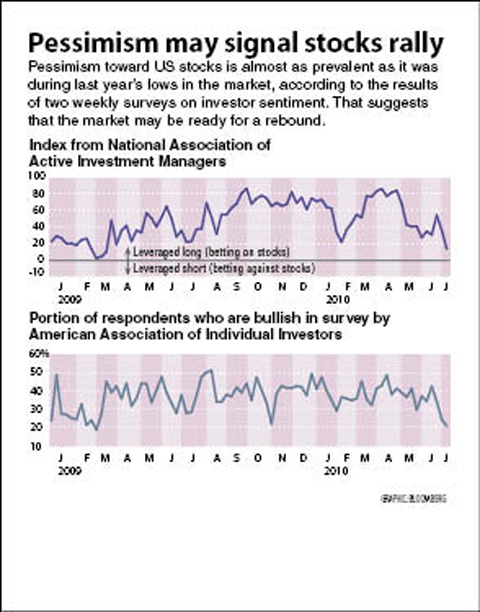US stocks chalked up their best weekly gains in a year as investors keep a close eye on the second quarter corporate earnings season beginning tomorrow.
With fears of a double-dip recession receding, the blue-chip Dow Jones Industrial Average jumped 5.3 percent during the holiday-shortened week to end Friday at 10,198.03.

The tech-rich NASDAQ composite index gained 5 percent over the week at 2,196.45 while the Standard & Poor’s 500 index, a broader measure of the market, was up 5.4 percent to 1,077.96.
The market received a fillip from news that the number of Americans registering for unemployment benefits declined and that the IMF increased its world growth forecast.
“The new notion after this week is that the double-dip recession may not come, or if it does that it won’t be a repeat of The Great Recession,” Jon Ogg of 27/7 Wall St said.
However, he cautioned that there were still risks in stocks and earnings, as key government and private indicators showed that recovery in the world’s largest economy was slowing.
“While many companies will talk about currency and healthcare and other charges impacting the net this year, it is the top-line and the stability of revenues and spending that are likely to take precedent,” Ogg said.
Many sectors were already down 10 to 20 percent since the start of the last earnings season, he said.
The stock rally “could suddenly end” if earnings data were “even slightly disappointing,” said Frederic Dickson, chief market strategist of DA Davidson & Co.
“Our view is that we may see companies deliver mixed results versus analysts’ expectations in the upcoming earnings reporting season, with the market possibly having to digest more disappointments than seen last quarter given the sudden pause in the economy that developed in May and early June,” he said.
Analysts at IHS Global Insight, however, painted a positive earnings outlook.
“The corporate earnings momentum overall should remain solid, especially the year-over-year comparisons,” they said in a note to clients.
There are also some signals that the loan charge-offs in the banking sector might be close to cresting, they said.
“That rite of passage for the banking sector, when it comes, will be a watershed for the current cyclical recovery,” the analysts said.
Generally, the economic tea leaves the coming week will point to a pending mid-cycle slowdown in growth, as last month’s retail sales and industrial production are expected to peel back, the analysts said. Traders will also be closely monitoring the US Federal Reserve’s release on Wednesday of the minutes from last month’s meeting of its policy-making body.
There were no changes to interest rates at the meeting, but the Fed downgraded its assessment of the economy stating that financial market conditions were “less supportive” of economic growth amid the debt crisis in Europe, analysts at Charles Schwab & Co said.
As stocks jumped the past week, bonds plunged. The yield on the 10-year Treasury bond rose to 3.056 percent from 2.979 percent last week while that on the 30-year bond climbed to 4.040 percent from 3.941 previously. Bond prices and yields move in opposite directions.

CHIPMAKING INVESTMENT: J.W. Kuo told legislators that Department of Investment Review approval would be needed were Washington to seek a TSMC board seat Minister of Economic Affairs J.W. Kuo (郭智輝) yesterday said he received information about a possible US government investment in Taiwan Semiconductor Manufacturing Co (TSMC, 台積電) and an assessment of the possible effect on the firm requires further discussion. If the US were to invest in TSMC, the plan would need to be reviewed by the Department of Investment Review, Kuo told reporters ahead of a hearing of the legislature’s Economics Committee. Kuo’s remarks came after US Secretary of Commerce Howard Lutnick on Tuesday said that the US government is looking into the federal government taking equity stakes in computer chip manufacturers that

NORTHERN STRIKE: Taiwanese military personnel have been training ‘in strategic and tactical battle operations’ in Michigan, a former US diplomat said More than 500 Taiwanese troops participated in this year’s Northern Strike military exercise held at Lake Michigan by the US, a Pentagon-run news outlet reported yesterday. The Michigan National Guard-sponsored drill involved 7,500 military personnel from 36 nations and territories around the world, the Stars and Stripes said. This year’s edition of Northern Strike, which concluded on Sunday, simulated a war in the Indo-Pacific region in a departure from its traditional European focus, it said. The change indicated a greater shift in the US armed forces’ attention to a potential conflict in Asia, it added. Citing a briefing by a Michigan National Guard senior

POWER PLANT POLL: The TPP said the number of ‘yes’ votes showed that the energy policy should be corrected, and the KMT said the result was a win for the people’s voice The government does not rule out advanced nuclear energy generation if it meets the government’s three prerequisites, President William Lai (賴清德) said last night after the number of votes in favor of restarting a nuclear power plant outnumbered the “no” votes in a referendum yesterday. The referendum failed to pass, despite getting more “yes” votes, as the Referendum Act (公民投票法) states that the vote would only pass if the votes in favor account for more than one-fourth of the total number of eligible voters and outnumber the opposing votes. Yesterday’s referendum question was: “Do you agree that the Ma-anshan Nuclear Power Plant

ENHANCED SECURITY: A Japanese report said that the MOU is about the sharing of information on foreign nationals entering Japan from Taiwan in the event of an emergency The Ministry of Foreign Affairs yesterday confirmed that Taiwan and Japan had signed an agreement to promote information exchanges and cooperation on border management, although it did not disclose more details on the pact. Ministry spokesman Hsiao Kuang-wei (蕭光偉) said the ministry is happy to see that the two nations continue to enhance cooperation on immigration control, in particular because Taiwan and Japan “share a deep friendship and frequent people-to-people exchanges.” “Last year, more than 7.32 million visits were made between the two countries, making it even more crucial for both sides to work closer on immigration and border control,” he said. Hsiao